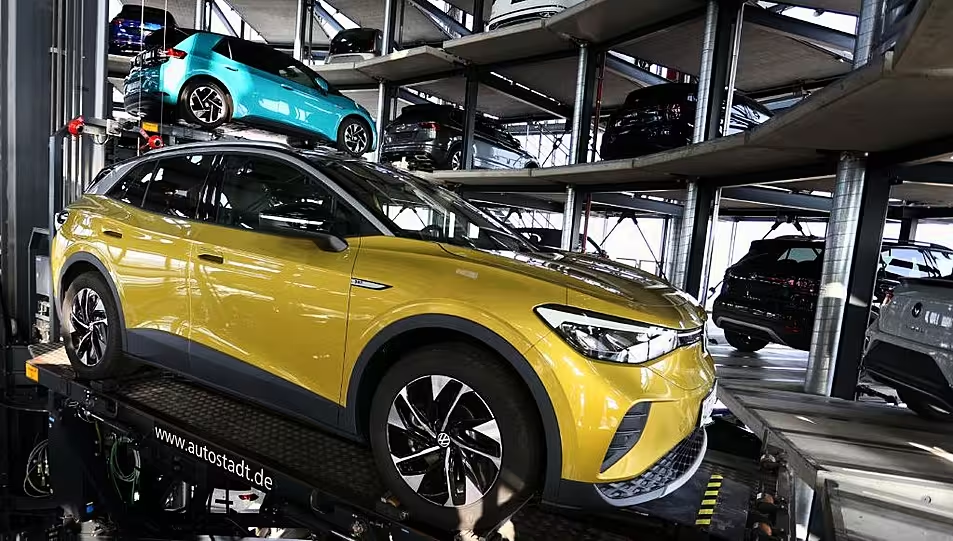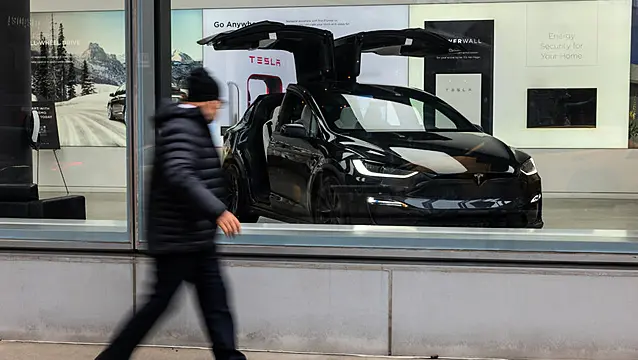The prices of electric cars have at last started to fall. Last year, the price-per-kilowatt-hour (kWh) of lithium-ion batteries (those that power electric cars, your phone, your laptop etc) fell to less than $100 (€93), a drop of some 33 per cent compared to 2022. That price is expected to drop again this year.
According to Dave Watson, chief executive of Ohme chargers: “The cost of making batteries was on the way down, and then a couple of years ago it flatlined, before going back up. Now, last year they’ve dropped by 25 per cent, and they’re going to drop another 25 per cent in the next six months.
"The big Chinese battery makers might take another 25 per cent off that, so we’re getting down to a point where a battery will cost something like 4c per watt-hour. That means an average-sized 64kWh battery will cost something like €2,500 to €3,000.”
Cheaper batteries means much, much cheaper electric cars.
That is already starting to happen. Already, the €25,000 electric car is a reality, as within a few weeks, BYD — the gigantic Chinese car maker that’s growing so fast it’s building its own ro-ro cargo ships to deliver those cars all over the world — will start to sell a version of the Dolphin hatchback in Ireland which will have a range of 340km and a price tag of €25,570.
The Dolphin is not some small, budget-spec model either — it’s slightly larger than a VW Golf and has quite a well-appointed cabin.
Renault will be next up in the €25,000 club when it launches the new electric Renault 5 at the Geneva Motor Show.
Tesla can’t seem to stop chopping its prices — the cost of a Model Y SUV (currently the world’s best-selling car overall) has fallen by as much as €8,000 in recent months, and the Model 3 saloon has seen similar cuts. Tesla has said that it’s because the company is passing on savings from more efficient production methods, but industry analysts say it’s because the EV car brand is trying to stay one step ahead of cheaper Chinese competitors.
Volkswagen, too, has been cutting costs of late, partly in response to Tesla’s price slashing.
The ID.3 electric hatchback, and the ID.4 electric SUV — which was the best-selling EV in Ireland last year — have both seen significant four-figure price cuts, and VW Ireland is trumpeting that you can currently save as much as €10,000 across its entire ID electric car lineup. It, too, has a €25,000 EV in the offing — the ID.2, which should be on sale this time next year.
This is good news, isn’t it? Many people had said that they would not buy an electric car until prices came down to more sensible levels, more in line with the price tags of traditional combustion-engined cars.
With car makers apparently tripping over themselves to chop prices and put low-cost finance offers into the market, that can only be a good thing. Can’t it?
Well, not quite. The problem is that this drop in new-car EV prices is having a deleterious effect on the second-hand prices of electric models.

For some customers it’s a disaster. One owner of a Volkswagen ID.4, who is a senior executive at a major Irish-based company, but who spoke to Breakingnews.ie on the condition that we not use their name, said: “At the time I bought into the whole turning green campaign and it being the ‘start of the end regarding internal combustion engines.’ Also the instability in supply chain resulted in large delays to new vehicles and resulted in a surge in second hand prices, I felt new was the sensible decision. It came down to choice: internal combustion, hybrid or EV.
"Having previously owned both internal combustion and hybrid and the increasing fuel costs due to Ukraine war, I decided that the EV option was an attractive one along with a government grant of €5,000 when the vehicle was below a €60,000 threshold.”
All well and good, and this person paid cash up front for their car, buying it outright.
“Since owning the vehicle, I have had a relatively uneventful 60,000km with the exception of a software update, which took an amazing three days to complete… My concerns started last year when Tesla slashed their new car prices, but personally owning a major German brand I believed, and had now realised misplaced confidence, that they would not copy the Tesla model regarding slashing prices.
"As the vehicle is approaching two years old and has 60,000km on the clock, I decided to look into upgrading to a new vehicle but to my amazement a vehicle that was purchased as a straight cash deal in 2022 for €59,995, I was offered a trade in of €33,000 with the same garage that sold me the vehicle some 22 months earlier. So minus the government grant of €5,000, I am looking at €22,000 depreciation in as many months. I went to another garage of the same brand and to my surprise it was possible to get worse news — an offer of €28,000 trade-in value.”
This owner noticed that a similar-specification diesel-engined model which was priced at €58,000 on the day they bought their ID.4 was being retailed second-hand on the same forecourt for €55,000.
“Due to the lack of charging infrastructure, expense of charging on the public network, range anxiety — our in-laws are in Galway — instantaneous fires and uncertainty once out of warranty, I think I may just have to bite the bullet and sell or trade my EV in for a more traditional internal combustion vehicle. The one thing that really rubs salt into the wound is the campaign highlighting up to €10,000 reduction in new similar model prices by my current vehicles’ manufacturer, effectively murdering my vehicles second hand value.
"I would have thought that buyers who are loyal to the brand would have been offered some sort of trade-in bonus to ease the pain of this unheard of vehicle depreciation since the '70s fuel crisis.
"Is Ireland ready for EV cars? From my personal experience, no. We will be shortly ordering a new diesel vehicle.”
For its part, Volkswagen Ireland said: “Equity positions are unique to each customer, and it is impossible to comment on individual cases. Our nationwide network of retailers work closely with customers who are in the market for a new vehicle to achieve the best possible outcomes” while also pointing out that the lower prices for the new models means that, in spite of depreciation, the cost of trading-up remains quite low.
Is there a lesson to be learned from all this?
Possibly only that, when any new technology enters the market, it’s always wise to be prudent, and equally very easy to say that after the fact.
Generally, the best advice is only to buy a new EV on a PCP finance plan, which guarantees your second-hand value ahead of time — albeit it does not guarantee the trade-in value above that figure, meaning that if prices fall as dramatically as they have done, you might find yourself without enough ‘equity’ in the value of your car to act as a sufficient deposit for the next one.
The broader problem is that this will undoubtedly affect the take-up of electric vehicles amid the wider car-buying populace.
In the US market, Edmunds — one of the leading analysts of the used car market — proclaimed in its 2023 Used Vehicle Report that: “With electric vehicle demand slowing and dealers struggling to move new EVs off lots, the near-immediate impact on used values should be unsettling to anyone who has recently bought an EV, new or used.
"Such large, overarching price adjustments are rare, even when there’s increased competition with traditional gas-engine vehicles or redesigns that usher in selldowns of outgoing models. The difference here is the price cuts aren’t just for one or two new models; new EVs across the board are collecting dust, requiring discounts in addition to the already hefty tax credits to move into buyers' hands. Beyond pricing issues for new EVs, the low resale values for used EVs could become a major deterrent to new EV purchases and EV adoption more broadly.”
This article was amended at 7am on Wednesday, February 2nd to correct a figure in a quote.







